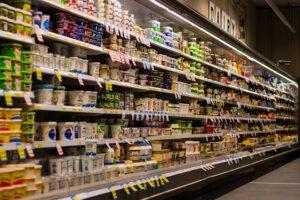NAK: The ratio of domestic products in stores must be maintained
The National Chamber of Agrarian Economy initiated a wide-ranging professional consultation with the food retail players operating in our country. The purpose of the meeting was to ensure that, despite cheap imports that promise significant economic benefits, the proportion of Hungarian products in the supply of domestic retail chains does not decrease.

(Photo: Pixabay)
On August 8, the National Chamber of Agrarian Economy (NAK) discussed the role of domestic products and their place in food retail with representatives of domestic retail chains. The meeting was attended by, among others, the Association of Responsible Food Manufacturers (FÉSZ), the Ministry of Agriculture, the Economic Competition Authority with consultative rights, the National Trade Association and the Hungarian National Trade Association.
The participants of the meeting reviewed important market and regulatory changes in terms of domestic food retailing, as well as the challenges affecting the sector
The parties agreed that the traders – understanding the nature of this social measure – conveyed a significant discount to Hungarian customers during the period of the food price freeze. At the same time, as the organizations representing producers, food producers, and traders have previously indicated, the price cap initiated unfavorable processes in retail trade and strengthened it in the food chain, its elimination became necessary, which is welcomed. In addition to the price stop, the current meeting also discussed the experiences of mandatory store sales and the operation of the online price monitoring system. Balázs Győrffy, the president of NAK, called the attention of the representatives of the present chain stores (Metro, Tesco, Auchan, Spar, Lidl, Aldi, Penny, COOP, Reál) to the fact that although in connection with the government measures taken to reduce food inflation, the cheap imported goods that promise a short-term economic advantage, however, in order to maintain the operation of domestic enterprises, it is still extremely important to maintain and increase the proportion of domestic products in retail. – On behalf of the Hungarian food industry, we ask the retail chains to help the turnover of Hungarian food products and increase the share of Hungarian products on the shelves as much as possible – pointed out the president of NAK. He emphasized: the chamber and the professional organizations are ready to provide assistance to the players in the retail trade in relation to the promotion of Hungarian products.
Tamás Éder, the president of FÉSZ, reminded that after our country’s accession to the EU, the proportion of Hungarian products in the range of retail chains has continuously decreased
All of this was indicated not only by the shelf mirror survey conducted by the National Food Chain Safety Office, but also by the fact that for a decade and a half, the increase in the domestic sales of the Hungarian food industry players significantly lagged behind the increase in food retail turnover. Although starting from 2018 – thanks to the cooperation between the food industry and retailers – this process was reversed for a few years and the proportion of domestic products in circulation increased, but this year the situation is worsening again. All of this is also reflected in the performance of the Hungarian food industry this year: after the 13 percent decline experienced in the first quarter, the output of the sector decreased by 20 percent in April and by 17 percent in May. Meanwhile, processors have to operate with increasing production costs.
In order to maintain domestic production, in recent years several store chains have undertaken to increase the proportion of Hungarian products, even within a single product category
This was highly appreciated by the actors of the domestic food industry. According to the chamber’s hopes, domestic retailers will continue to be partners in the future in bringing Hungarian products to the market and in supporting the maintenance of food industry production. The participants agreed that the domestic production and processing industry must improve its efficiency in the short term, because that is the only way they can remain dominant players in the domestic food supply chain in the long term.
NAK
Related news
Related news
ZEW: Economic expectations worsened in Germany and the euro area in February
🎧 Hallgasd a cikket: Lejátszás Szünet Folytatás Leállítás Nyelv: Auto…
Read more >NKFH: inspections focus on discount prices and customer deception
🎧 Hallgasd a cikket: Lejátszás Szünet Folytatás Leállítás Nyelv: Auto…
Read more >







